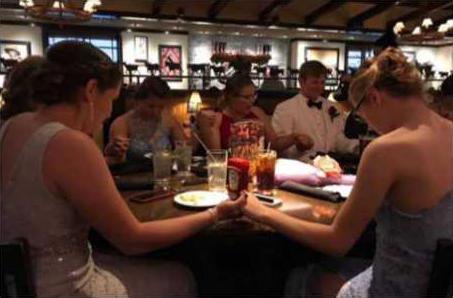A photo of a group of teens in California praying before dinner on prom night caused an uproar on social media about what it means to be a good kid.
KTVU journalist Frank Somerville posted the photo of the teens saying grace, which he originally received from one of the teen's mothers. Somerville celebrated the group for behaving well on prom night.
So impressed with these young people on their prom date at Longhorn, he wrote on the post. They all said Grace before eating and were all well behaved.
Somerville said Noelle Smith, mother of one of the kids, sent a note with the photo, too.
Good morning," Smith wrote to Somerville, according to his post. "Thank you for everything that you do. I want to share a picture of my daughter and her friends from prom night. Now with the stories today about teenagers and Tide pods and condoms gathering headlines this picture speaks for itself.
Somerville added, "It sure does. Its REALLY nice to see."
The photo received more than 2,000 "likes," 215 "shares" and 400 "comments" since it was first posted on Tuesday.
But, as Fox News reported, the picture kick-started a debate among the Facebook commenters over what it means to be a good kid.
Commenters specifically took umbrage with Somervilles post, which, they said, implied that you had to pray or say grace to be considered a good kid.
One commenter said, Saying grace over your food says nothing of your moral compass, integrity or character Behaving well at a restaurant while in your late teens, and being considerate (of) people, should not be Facebook praiseworthy.
Another wrote, I see well-behaved people doing terrible things, misbehaved people who just take care of someone in need. Being a (C)hristian doesnt mean they are well behaved.
Somerville commented on the post to respond to the critics. He said he felt surprised that the photo received such heavy backlash.
I'm honestly surprised by some of these comments, he wrote. I wasn't trying to imply that you have to be a Christian to be a good person. What I see from these kids is that they are respectful, that they are humbled and that they are appreciative (of) what they have. I could care less whether they are religious, but by saying grace it shows me that they have those qualities and those are the qualities, regardless of whether you believe in god, that I admire.
According to Yahoo! News, the mother who took the photo also interjected to reveal her thoughts on the picture.
They conducted themselves as adults. Not because they prayed but because they sat up straight in their chair, they didnt disrupt others, and (they) showed and used good manners which is the whole point and also that we as parents have done our job producing productive members of society!
KTVU journalist Frank Somerville posted the photo of the teens saying grace, which he originally received from one of the teen's mothers. Somerville celebrated the group for behaving well on prom night.
So impressed with these young people on their prom date at Longhorn, he wrote on the post. They all said Grace before eating and were all well behaved.
Somerville said Noelle Smith, mother of one of the kids, sent a note with the photo, too.
Good morning," Smith wrote to Somerville, according to his post. "Thank you for everything that you do. I want to share a picture of my daughter and her friends from prom night. Now with the stories today about teenagers and Tide pods and condoms gathering headlines this picture speaks for itself.
Somerville added, "It sure does. Its REALLY nice to see."
The photo received more than 2,000 "likes," 215 "shares" and 400 "comments" since it was first posted on Tuesday.
But, as Fox News reported, the picture kick-started a debate among the Facebook commenters over what it means to be a good kid.
Commenters specifically took umbrage with Somervilles post, which, they said, implied that you had to pray or say grace to be considered a good kid.
One commenter said, Saying grace over your food says nothing of your moral compass, integrity or character Behaving well at a restaurant while in your late teens, and being considerate (of) people, should not be Facebook praiseworthy.
Another wrote, I see well-behaved people doing terrible things, misbehaved people who just take care of someone in need. Being a (C)hristian doesnt mean they are well behaved.
Somerville commented on the post to respond to the critics. He said he felt surprised that the photo received such heavy backlash.
I'm honestly surprised by some of these comments, he wrote. I wasn't trying to imply that you have to be a Christian to be a good person. What I see from these kids is that they are respectful, that they are humbled and that they are appreciative (of) what they have. I could care less whether they are religious, but by saying grace it shows me that they have those qualities and those are the qualities, regardless of whether you believe in god, that I admire.
According to Yahoo! News, the mother who took the photo also interjected to reveal her thoughts on the picture.
They conducted themselves as adults. Not because they prayed but because they sat up straight in their chair, they didnt disrupt others, and (they) showed and used good manners which is the whole point and also that we as parents have done our job producing productive members of society!








